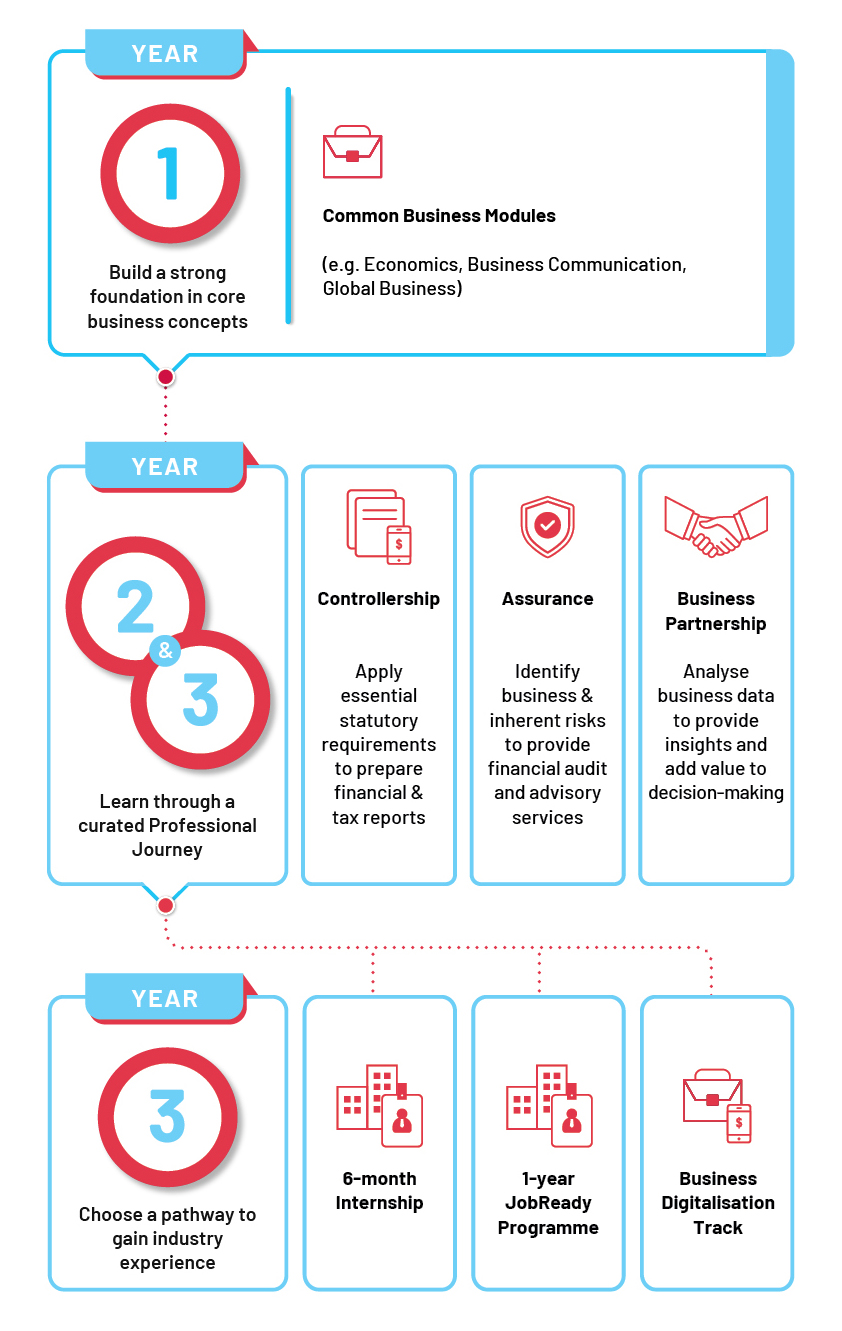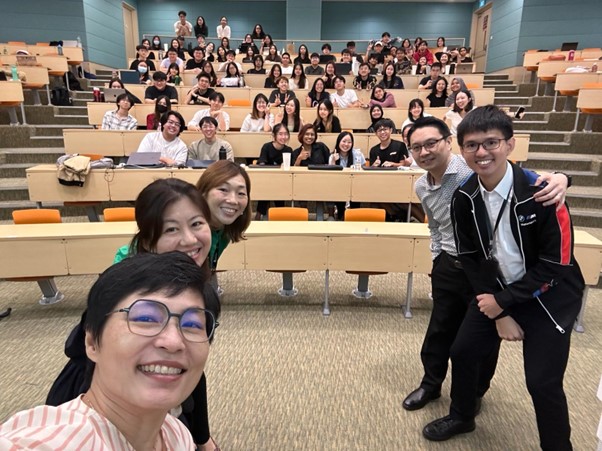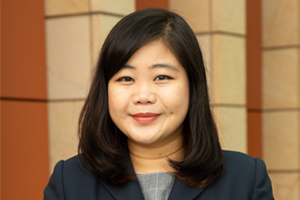Why ACC?
- Our curated “Professional Journey” equips you with confidence and skills for key roles in the industry including corporate finance, assurance and business partnership
- Become a forward-looking accounting professional with strong digital skills and understanding of sustainability practices
- Shape your learning experience by choosing from pathways such as the one-year JobReady Programme or Business Digitalisation Track
- Enjoy accreditation and module exemptions at many universities and professional bodies
About ACC
Accounting goes beyond just bookkeeping and budgeting – it turns business data into valuable insights. In today’s fast-paced business world, financial experts play a key role in evaluating business risks, performing strategic analyses, and identifying opportunities. If you’re excited by these challenges, our Diploma in Accountancy (ACC) is the perfect choice for you!
ACC provides a strong foundation in both technical knowledge and transferable skills, opening doors to various career options. You will also gain digital skills and learn about sustainability, preparing you to become a future-ready accounting professional!
ACC equips you with skills in data analytics, cloud accounting and robotic process automation (RPA). You will apply your digital know-how to solve industry challenges through hands-on projects. With corporate sustainability now central to the workplace, ACC will equip you with skills needed to assess the financial impacts of climate-related risks and opportunities, as well as to set sustainability goals that drive business success.
In your final year, you can explore internship opportunities at one of the Big Four international accounting firms and renowned organisations such as Deloitte, EY, GIC, KPMG, PwC Singapore, Robert Bosch and RSM. Alternatively, you can build your knowledge,
network and portfolio with our one-year JobReady Programme. You may also choose the Business Digitalisation Track to deepen your digital skills in emerging areas, such as artificial intelligence and digital marketing, through two internship stints.

As an ACC graduate, you will enjoy accreditation
and module exemptions from many universities and
professional bodies such as Association of Chartered
Certified Accountants (ACCA), Chartered Institute
of Management Accountants (CIMA), Institute of
Singapore Chartered Accountants (ISCA), and Institute
of Chartered Accountants in England and Wales
(ICAEW). You can look forward to completing your
degree or professional examinations ahead of your
peers.
Overview of Your ACC Journey

Highlights
Impactful Internships
Further Studies
ACC is recognised by all local and many overseas universities. Many universities in Australia and the United Kingdom offer up to one year of exemption. You will also enjoy module exemptions for courses and examinations by the Association of Chartered Certified Accountants (ACCA), Chartered Institute of Management Accountants (CIMA), Institute of Singapore Chartered Accountants (ISCA) and Institute of Chartered Accountants in England and Wales (ICAEW).
In partnership with the Accounting and Corporate Regulatory Authority and Workforce Singapore, NP has launched a 12 to 18-month work-study programme under the SkillsFuture initiative. This programme offers an accelerated alternative pathway for Accountancy diploma holders to enter the profession without a degree qualification.
| Chartered Accountant of Singapore |
Singapore CA Qualification (Professional Programme) |
Advanced Diploma in Accountancy (Singapore CA Qualification Foundation Programme) |
| Diploma in Accountancy |
Careers
You can look forward to exciting and rewarding careers in roles such as:
- Business Advisor
- Business Analyst
- Digital Transformation Specialist
- Financial Accountant
- Financial Auditor
- Forensics Accountant
- Internal Auditor
- Management Accountant
- Sustainability & Climate-change Consultant
- Tax Associate
Entry Requirements
AGGREGATE TYPE ELR2B2-B
To be eligible for consideration, candidates must have the following GCE ‘O’ Level examination (or equivalent) results.
| Subject | 'O' Level Grade |
|---|---|
| English Language | 1-6 |
| Additional Mathematics/Mathematics | 1-6 |
| Any one of the 2nd group of Relevant Subjects for the ELR2B2-B Aggregate Type | 1-6 |
Applicants must also fulfil the aggregate computation requirements for the ELR2B2-B Aggregate Type ( English Language, 2 relevant subjects and 2 other best subjects) listed at www.np.edu.sg/docs/ELR2B2.pdf .
For students with other qualifications, please refer to the NP website for the entry requirements and admissions exercise period.
What You Will Learn
Economics (3 Credit Units)
This module provides students with an understanding of the core principles of microeconomics and macroeconomics with an application of these concepts in real-world business scenarios. Topics include Demand and Supply, Price Elasticity, Market Structure, Gross Domestic Product, Unemployment, Inflation, Fiscal and Monetary policy.
Global Business (3 Credit Units)
This module provides students with fundamental knowledge of how the external business environment, consisting of country and industry level factors, affects the overall strategy, organisational structure and various internal functions of international businesses. Students will also discuss how contemporary world affairs, such as the impact of globalisation, terrorism, pandemics, emergence of economic powers in Asia and digitalisation present both opportunities and challenges to international businesses.
Makings of a Business (4 Credit Units)
Students will gain hands-on and real-world experience as they actively learn to integrate and apply knowledge and skills acquired in various modules to manage different types of businesses through game simulation. They will gain understanding of the inter-dependence of the different business functions, and to make data-driven decisions to address day-to-day operations of a business. They will also develop critical thinking and complex problem-solving skills as they analyse performance data and evaluate decisions to improve overall company performance.
Programming for Business (3 Credit Units)
This module provides students with fundamental programming concepts and best coding practices through the extensive use of in-class demonstrations and hands-on practices. Students will learn how technology functions by building digital solutions such as business applications and tasks automation by applying their programming skills. Students will learn how to problem solve through computational thinking.
Statistical Applications for Business (4 Credit Units)
This module introduces students to basic statistical concepts, tools and models. Students will learn how to organise and analyse data, as well as interpret results for decision-making in the business world. Students will apply and reinforce their learnings through data presentation and performing descriptive analysis on data generated from the Business Simulated Game.
Health & Wellness (1 Credit Unit)
This is a Level 1 Core module for all Year 1 students. The module will introduce students to the importance of maintaining both physical and mental health through the knowledge and monitoring of health indicators, and application through appropriate exercises. The aim of the module is to empower students with basic knowledge and skills to be independent and responsible in maintaining overall personal health.
Innovation Made Possible^ (3 Credit Units)
English Language Express* (Credit Units - NA)
English Language Express aims to give you a better grounding in the English Language and to strengthen the written and oral communications skills that you will need in your academic and professional careers. You will be engaged in writing, reading, listening and speaking activities that will develop your ability to speak and write grammatically, coherently and clearly. You will also hone your reading and listening comprehension skills.
^ Critical Core modules account for 10 credit units of the diploma curriculum. They include modules in innovation and world issues, as well as an interdisciplinary project. By bringing students from diverse diplomas together, the interdisciplinary project fosters collaboration to explore and propose solutions for real-world problems. NP aims to develop students to be agile and self-directed learners, ready for the future workplace.
This module teaches students to effectively refine their written and spoken communication skills, discussion techniques, and people skills. Students will learn techniques to think on their feet to deliver an effective business pitch confidently. They will learn to persuasively communicate opportunities and ideas by creatively tailoring their business message for their target audience using storytelling techniques. Students will also develop their information literacy skills to craft clear business messages using APA style referencing.
Business Law (3 Credit Units)
This module provides students with an understanding of the basic knowledge of the law and its application in a business environment. Topics include the Singapore Legal System, Law of Contract, Law of Tort, Law of Agency/E-Commerce/Artificial Intelligence Law (E-Comm/AI Law), Law of Business Organisations, Introduction to Company Law and Intellectual Property Law. Students will also develop clarity of thought that requires a critical discerning eye and logical reasoning when applying legal principles to practical business decisions.
Kickstart a Business (4 Credit Units)
The module is designed for students to integrate and apply learning from the different modules to address real-world challenges provided by industry partners. Using the Lean methodology, students will build a Lean Canvas Model to develop and showcase a minimum viable product to address challenges and evaluate opportunities. They will learn about resource optimisation and value creation for businesses.
Finance & Accounting for Business (3 Credit Units)
The module imparts basic accounting and finance knowledge to students, in areas such as accounting equations, accounting principles, financial statements, ratio analysis, cash budgeting, short-term financing strategies, time value of money and capital investment analysis. Students will demonstrate their understanding by using financial software to interpret financial accounting information for decision-making in business environments when working on integrated project scenarios.
User-Centred Design for Business (3 Credit Units)
The module covers digital media design competencies with user-centered design principles. Students will learn to use design software and apply the design competencies on digital platforms such as web, mobile and desktop. Students will also learn to address digital design issues related to the user experience, presentation of the information, the imagery and the visualisation during their designing process.
Career & Professional Preparation (2 Credit Units)
This module supports students in their journey of self-discovery, character-building, NP values-inculcation, development of education and career goals via experiential activities and guided reflections with CPP coaches. To prepare them for their career and the future, students will also deepen their knowledge of the respective diploma curriculum and industries through learning journeys, mentorship and opportunities for interactions with alumni and industry practitioners. The module will incorporate a more comprehensive feedback and reflective approach from self, peers, tutors and the industry mentor to support students’ holistic growth and development.
Company Law & Secretarial Practice (3 Credit Units)
This module covers topics relating to company law including effects of incorporation, directors’ duties and liabilities, members’ rights, share capital, debentures, corporate rescue schemes and liquidation. Students will be familiarised with practical applications of the Companies Act and other relevant legislation, and get exposure in corporate secretarial work.
Digitalisation & Data Analytics 1 (3 Credit Units)
This module covers the fundamental concepts and widely used tools of data analytics. Students will learn to communicate with database systems to extract relevant data, navigate a cloud-based financial accounting software and apply robotic tasks automation skills. These skills enable students to efficiently and effectively operate business processes as well as be key stewards of large-scale financial data.
Financial Accounting (6 Credit Units)
This module introduces students to the fundamental principles of accounting, accounting equation, double-entry, analysis and recording of business transactions. Basic concepts of sustainability accounting are also introduced. Other topics include end-of-period adjustments, accounting for cash & credit transactions, inventories, fixed assets, liabilities and preparation of financial statements for service and trading concerns.
Singapore Taxation (6 Credit Units)
This module gives an overview of the Singapore income tax system and its tax administration. It introduces tax concepts and principles in the areas of individual and corporate taxation as well as goods and services tax. Students will learn to prepare income tax computations for individuals and companies, including applying tax concepts in tax planning strategies.
World Issues: A Singapore Perspective^ (2 Credit Units)
^ Critical Core modules account for 10 credit units of the diploma curriculum. They include modules in communication, innovation and world issues, as well as an interdisciplinary project. By bringing students from diverse diplomas together, the interdisciplinary project fosters collaboration to explore and propose solutions for real-world problems. NP aims to develop students to be agile and self-directed learners, ready for the future workplace.
Assurance, Risk & Forensic Accounting (6 Credit Units)
This module introduces business risk assessment, sustainability-related risks, application of internal controls to business and analysis of financial information to detect financial reporting misconduct. It covers audit planning, control testing and audit procedures that comply with Singapore Standards on Auditing. It equips students with relevant skills and attitudes, as well as the professional skepticism and judgement for a career in assurance.
Business Communication 2 (4 Credit Units)
This module builds on the foundation of Business Communication 1 and creates opportunities for students to strengthen their oral and written communication. Students will be required to enhance their presentation skills through impromptu speeches. Students will also learn how to prepare a business proposal. Job hunting and employment skills will be introduced to prepare students for a positive start to their careers. Students will learn about personal branding and will be taught to write application letters and resumes. Additionally, students will learn job interview techniques through role-plays and simulations.
Corporate Reporting (6 Credit Units)
This module develops students' ability to prepare financial statements and disclosure requirements for limited liability companies that are in compliance with the minimum disclosure requirements of Singapore's Financial Reporting Standards (FRS) and relevant regulations. Topics covered include financial reporting for limited liability companies, as well as accounting principles in selected FRSs.
Digitalisation & Data Analytics 2 (3 Credit Units)
This module covers the use of an in-demand programming language incorporating descriptive and predictive analytics and the application of techniques to identify data quality issues and perform data cleansing. Students will also learn widely used business intelligence tools and apply these skills to convert data into meaningful visualisation for making insightful business decisions.
Advanced Corporate Reporting & Sustainability (6 Credit Units)
The module aims to deepen students’ understanding of sustainability and equip students with in-depth knowledge of more complex accounting concepts covering selected Singapore’s Financial Reporting Standards (FRS) as well as preparation of consolidated financial statements in order to present financial information in a form complying with professional requirements, using service-learning as one of the pedagogies.
Corporate Finance (4 Credit Units)
This module provides students with the fundamental knowledge in financial management. It gives an overview of the local corporate advisory services as well as business valuations. Students are given the opportunity to understand as well as explore the use of appropriate approaches and valuation tools to assess and value projects, business segments and companies.
Decision-Making & Control for Business (6 Credit Units)
Students are introduced to cost and management accounting techniques for business planning, decision-making and cost control. Students learn to identify key business and sustainability-related issues in different real-world scenarios and aid management in making informed and timely decisions. Upon completion, students are well-prepared to become a valued managerial accountant.
Project ID: Connecting The Dots^ (4 Credit Units)
^ Critical Core modules account for 10 credit units of the diploma curriculum. They include modules in communication, innovation and world issues, as well as an interdisciplinary project. By bringing students from diverse diplomas together, the interdisciplinary project fosters collaboration to explore and propose solutions for real-world problems. NP aims to develop students to be agile and self-directed learners, ready for the future workplace.
Students will intern for six months with international accounting firms, financial institutions, manufacturing companies or public sector entities. Under the mentorship of professional practitioners, they will experience and learn from the challenges of the working environment.
Ethics for the Professional Accountant (2 Credit Units)
This module is an introduction to ethical codes that Institute of Singapore Chartered Accountants (ISCA) members adhere to. These include Ethics Pronouncements (EP) 100 on Code of Professional Conduct and Ethics, and EP 200 on Anti-Money Laundering and Countering the Financing of Terrorism. Students will learn about possible threats to compliance and safeguards to address these threats.
Year 3
Business Digitalisation Track
Students will learn and apply the techniques in Business Intelligence and Analytics technologies to transform the reporting and analysis of businesses through visualisation and utilise the predictive capabilities of analytics. They will learn to aggregate diverse and complex data to build purposeful data repositories for analysis through business models such as regression, association, clustering and sales funnels. Students are expected to describe and analyse their findings through dash boarding and appropriate forecasting techniques.
Artificial Intelligence & Robotics (3 Credit Units)
Students will learn about the nature and types of AI and Robotics. They will also examine how these two areas are being applied in organisations and businesses. Students will go on learning journeys to see real life examples and applications and interact with its practitioners. Students will also need to complete practical projects on AI for an SME. For example, the project could be the implementation of AI in Human Resource. Students will also be exposed to the AI tools and applications in the marketplace and have the opportunity to learn, try and possibly create some of them.
Digital Transformation Marketing Strategy (3 Credit Units)
Students will learn about the strategies in transforming Marketing through digital and social media for the purposes of stakeholder engagement, business expansion and brand building. Students will learn how digital and social media can shape new ways business organisations operate, and understand the impact of digital and social media on the business. Students will have the opportunity to learn through planning and developing a digital media strategy for a company and explore current digital media trends and strategies employed by successful organisations.
Emerging Technologies & Disruptive Innovation (2 Credit Units)
Students will survey the digital landscape and learn about emerging technologies such as AR/VR/MR, AI/Robotics, Analytics, Internet of Things (IoT) and the evolving nature of business platform models and the architecture of enterprise system. They will distil key lessons on the way these technologies are disrupting businesses and society. Students will learn about the innovation process in translating new and/or existing knowledge into marketable solutions. They will be able to better appreciate the disruptions facing businesses and acquire a change mindset.
10-Week internship (10 Credit Units)
This internship enables students to apply the competencies they acquire in the Business Digitalisation Track. Students are given the opportunity to work for a period of ten weeks in various industries and setups ranging from small and medium-sized enterprises, startups, multinational corporations to public service, with a role in a specific business digitalisation project. Industry practitioners will be mentors to the students.
The module aims to deepen students’ understanding of sustainability and equip students with in-depth knowledge of more complex accounting concepts covering selected Singapore’s Financial Reporting Standards (FRS) as well as preparation of consolidated financial statements in order to present financial information in a form complying with professional requirements, using service-learning as one of the pedagogies.
Ethics for the Professional Accountant (2 Credit Units)
This module is an introduction to ethical codes that Institute of Singapore Chartered Accountants (ISCA) members adhere to. These include Ethics Pronouncements (EP) 100 on Code of Professional Conduct and Ethics, and EP 200 on Anti-Money Laundering and Countering the Financing of Terrorism. Students will learn about possible threats to compliance and safeguards to address these threats.
12-week internship (9 Credit Units)
This 12-week internship, that is completed after students complete the Business Digitalisation Track, provides students the opportunity to apply competencies acquired in the Accountancy course to real-world issues in an accounting or related role. Students hone their 21st Century Competencies and deepen their learning of professional skills and industry code of ethics.
Project ID: Connecting The Dots^ (4 Credit Units)
^ Critical Core modules account for 10 credit units of the diploma curriculum. They include modules in communication, innovation and world issues, as well as an interdisciplinary project. By bringing students from diverse diplomas together, the interdisciplinary project fosters collaboration to explore and propose solutions for real-world problems. NP aims to develop students to be agile and self-directed learners, ready for the future workplace.
Year 3
One Year JobReady Programme
Industry Attachment 1 (18 Credit Units)
This work-study attachment provides authentic learning experiences in a real-world, and self-driven learning environment for students to apply their competencies to practical work issues. Students hone their 21st Century competencies, such as critical thinking and communication skills, and deepen their learning of professional skills and industry code of ethics.
Project ID: Connecting The Dots^ (4 Credit Units)
^ Critical Core modules account for 10 credit units of the diploma curriculum. They include modules in communication, innovation and world issues, as well as an interdisciplinary project. By bringing students from diverse diplomas together, the interdisciplinary project fosters collaboration to explore and propose solutions for real-world problems. NP aims to develop students to be agile and self-directed learners, ready for the future workplace.
This work-study attachment enables students to further acquire relevant work experience that intersperses with their coursework. Besides enabling students to gain competencies through service-learning and first-hand experience in the professional world, it helps build their portfolio and industry network. Students will be coached by a mentor in the company during their attachment.
Ethics for the Professional Accountant (2 Credit Units)
This module is an introduction to ethical codes that Institute of Singapore Chartered Accountants (ISCA) members adhere to. These include Ethics Pronouncements (EP) 100 on Code of Professional Conduct and Ethics, and EP 200 on Anti-Money Laundering and Countering the Financing of Terrorism. Students will learn about possible threats to compliance and safeguards to address these threats.








